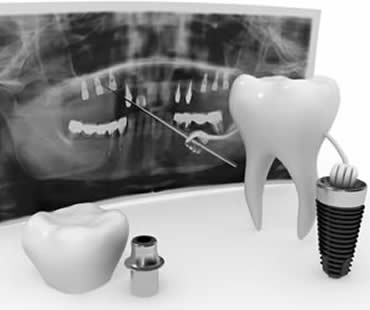
Feb 14, 2020 | Dental Topics 2, Implant Dentistry, Blog
Dental implants are used to replace individual or missing teeth or to anchor loose dentures. For many patients with these issues, traditional dental implants may not a viable option. For example, a patient who does not possess adequate bone levels to anchor the implants would not be a good candidate for traditional dental implants. With mini dental implants, the bone required to anchor the implant successfully is much less.
Thanks to advances in implant dentistry, these patients have other options. Mini dental implants have emerged as an attractive choice for cases that are not conducive to the placement of traditional implants. For the patient who has inadequate bone, the bone required to successfully anchor mini dental implants is much less. Unlike traditional implants, the placement procedure for mini dental implants is a minimally invasive procedure that can be completed in one appointment by a specially trained general or family dentist. Because the procedure is less involved, the pain and length of recovery is greatly diminished.
Patients who have existing health conditions that would preclude them from more invasive surgery may find mini dental implants an extremely appealing option. Mini implants are also a perfect choice for restoring one missing or damaged tooth. Should implant failure occur, grafting procedures would not be necessary because of the small size with mini dental implants.
Most importantly, mini dental implants maintain the look, feel and function of your natural teeth. While you have to wait months for traditional implants to fuse with the bone, mini dental implants are ready for immediate use. Talk to your dentist to determine if mini dental implants would be a good option for your dental restorations and get ready to face the world with a confident new smile.
If you live in the Conyers area contact us today

Nov 16, 2018 | Dental Topics 2, Implant Dentistry, Blog
Are you missing one or more teeth? Dental implants are among the best possible solutions for patients missing teeth. Dental bridges and dentures can fill the gaps left by acute decay or gingivitis, but dental implants have many advantages over these other techniques.
Dental implants are typically made of titanium and serve as an artificial root for a missing tooth. They are fused directly to the jawbone and become an excellent foundation for replacement teeth. They are the best possible substitute for a natural tooth that a dentist can provide.
Dental implant therapy has several benefits, among them:
- Dental implants are very convenient. Bridges necessitate cleaning carefully under and surrounding the bridged tooth, and dentures need to be removed and specially cleaned and can utilize messy adhesives to affix them to your mouth. Dental implants are cleaned exactly as you would clean your natural tooth. Brush and floss normally. There is no slippage or cleaning beneath or between the replacement tooth, which is permanently attached to the gum via the dental implant, which fuses to the bone in a process known as ossification.
- Dental implants look better than other replacement teeth. They are intended to appear and function as your natural tooth would.
- Because they’re fused to your bone, they are more secure than dentures or bridges that can slip in the oral cavity, causing pain, muddled speech and problems eating or drinking. Dental implants are incapable of slippage, leaving you to lead your life with confidence and security.
- Dental implants preserve bone by stimulating the bone in your jaw, something necessary for the health of the bone. Without this stimulation, the bone can begin to shrink.
- Dental implants are very durable and can last for decades, if not for a lifetime, when cared for properly.
- Because dental implants don’t require any alterations to the surrounding teeth, those natural teeth are able to remain intact, lending to your overall good oral health.
If you live in the Conyers area contact us today

Nov 28, 2024 | Dental Topics 3, Implant Dentistry, Blog
Dental implants are the state-of-the-art restorative solution for missing teeth. They provide a stable base that is the next best thing to a natural tooth root. Because of this and other qualities, dental implants are rising in popularity each year as more and more people discover their convenience and stability.
Dental implants are replacement teeth, typically made of porcelain or a similar material, mounted on top of a titanium screw that is embedded into a patient’s jawbone. Over time, this screw will fuse directly with the bone in a process known as ossification. This fusion creates a tooth base that is so stable, it’s as good as a tooth’s natural roots.
Dental bridges can become dislodged and food may collect under the bridge, leading to discomfort and bacteria build-up. A dental implant goes all the way down, so there’s no “under” underneath to collect food and cause problems.
Most tooth restorations necessitate special ways of cleaning or flossing, and you have to be careful you’re doing all the right things to maintain your teeth properly. You care for a dental implant the same way you do for a natural tooth, by brushing and flossing, so you don’t even have to think about it when you’re cleaning your mouth.
The bones in your jaw are only healthy as long as you have healthy tooth roots in them. The tooth roots stimulate the bone, signaling it to stay full and healthy. Without the stimulation of the roots, the bone begins to shrink away. Dental implants preserve bone by acting as artificial tooth roots. The jawbone can’t tell the difference, and the bone stays strong and robust.
These factors and more are leading patients to turn to dental implants to address their missing teeth. Talk to your cosmetic dentist to see why dental implants are the perfect choice for you.
We look forward to seeing you in our Conyers dental office

Nov 12, 2021 | Dental Topics 3, Implant Dentistry, Blog
Dental implants are the state-of-the-art restorative solution for missing teeth. They provide a stable base that is the next best thing to a natural tooth root. Because of this and other qualities, dental implants are rising in popularity each year as more and more people discover their convenience and stability.
Dental implants are replacement teeth, typically made of porcelain or a similar material, mounted on top of a titanium screw that is embedded into a patient’s jawbone. Over time, this screw will fuse directly with the bone in a process known as ossification. This fusion creates a tooth base that is so stable, it’s as good as a tooth’s natural roots.
Dental bridges can become dislodged and food may collect under the bridge, leading to discomfort and bacteria build-up. A dental implant goes all the way down, so there’s no “under” underneath to collect food and cause problems.
Most tooth restorations necessitate special ways of cleaning or flossing, and you have to be careful you’re doing all the right things to maintain your teeth properly. You care for a dental implant the same way you do for a natural tooth, by brushing and flossing, so you don’t even have to think about it when you’re cleaning your mouth.
The bones in your jaw are only healthy as long as you have healthy tooth roots in them. The tooth roots stimulate the bone, signaling it to stay full and healthy. Without the stimulation of the roots, the bone begins to shrink away. Dental implants preserve bone by acting as artificial tooth roots. The jawbone can’t tell the difference, and the bone stays strong and robust.
These factors and more are leading patients to turn to dental implants to address their missing teeth. Talk to your cosmetic dentist to see why dental implants are the perfect choice for you.
Schedule your appointment at our Conyers dental office

Mar 6, 2025 | Dental Topics 3, Implant Dentistry, Blog
If you have lost one or more teeth due to decay, disease or damage, you may be wondering what your options are for restoration. While there are several choices available to replace missing teeth, dental implants are considered the most innovative and advanced treatment option offered in dentistry today. A dental implant is a fabricated tooth root placed in the jawbone to secure a replacement tooth or bridge. With vigilant oral care, dental implants are highly successful and can last for a lifetime.
Dental implants are known to most closely act like your natural teeth. Their feel, function and appearance resemble that of a natural tooth. Unlike dentures, dental implants do not require special glues or adhesives. Implants are cared for exactly like your natural teeth, only requiring you to brush and floss normally and maintain regular dental checkups and cleanings.
Another benefit of dental implants is their ability to preserve your natural facial structure by preventing and slowing the bone resorption caused by tooth loss. Traditional dentures do not offer this advantage.
Patients who choose traditional dentures to replace missing teeth may also find they have trouble eating or speaking due to ill-fitting or slipping appliances. Because they function like natural teeth, with dental implants you will enjoy all your favorite foods and never have to worry about your dental appliance shifting or clicking.
Consult with your dentist to find out more about how dental implants can provide you with a lifelong solution to your missing teeth. Your dentist will assess your specific needs and determine if you are a good candidate for implants, so you can get back to enjoying life with a full set of healthy teeth.
We treat patients from Conyers and the surrounding area

Apr 15, 2022 | Dental Topics 3, Implant Dentistry, Blog
Dental implants are an option for people who have lost a tooth or teeth due to decay or damage. With implants, an artificial tooth root is placed into your jawbone to provide support for crowns and dentures. When considering implant treatment, you may have some of the following questions and concerns:
- Who is a candidate for dental implants? Implants can be placed in almost anyone after adolescence or when bone growth has completed.
- Is implant surgery painful? No, implant treatment is usually performed under local anesthesia in your dentist’s office.
- How long does it take to place dental implants? Depending on the number of implants placed, the procedure can usually be completed in less than an hour.
- What kind of recovery can I expect after a dental implant procedure? Healing from implant surgery is usually quick and uneventful. Any pain or discomfort should be minimal and easily controlled with anti-inflammatory medication. Most patients can return to normal activity the next day.
- How long will it take before I receive my new teeth? Because the implants need time to fuse to the bone, the entire process can take up to six months. Typically, you will receive some form of temporary teeth during this period. Treatment time varies depending on your treatment needs.
- Is caring for my implants difficult? Caring for your dental implants is the same as caring for your natural teeth. Implants simply require consistent brushing and flossing and regular dental visits for routine cleanings.
- How long will my implants last? When cared for properly, dental implants should last for decades.
- Are dental implants safe? When used in qualified candidates, dental implants are an exceptionally low-risk restoration option.
In general, dental implants have a success rate of up to 98%. With proper care, implants can last a lifetime.
If you need a dentist in Conyers contact us today







